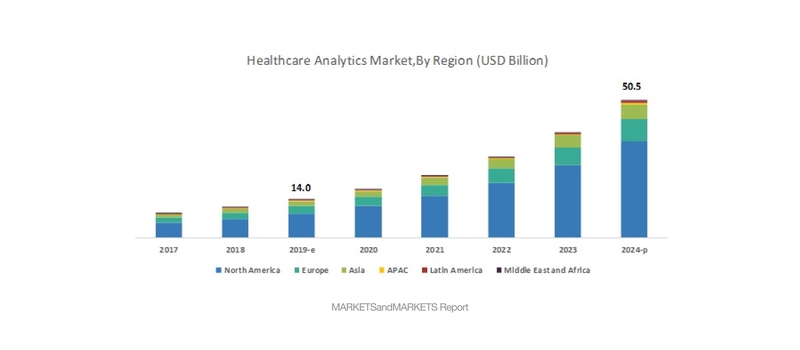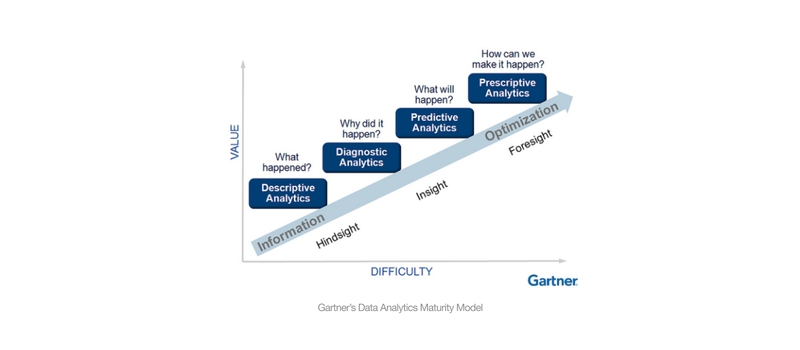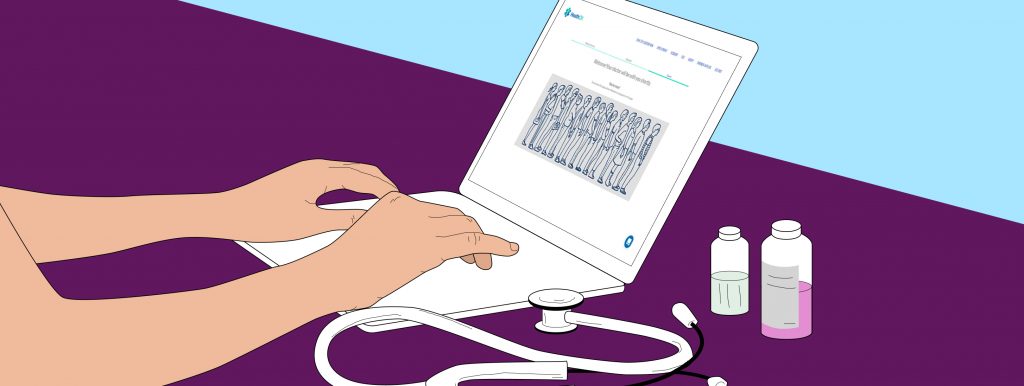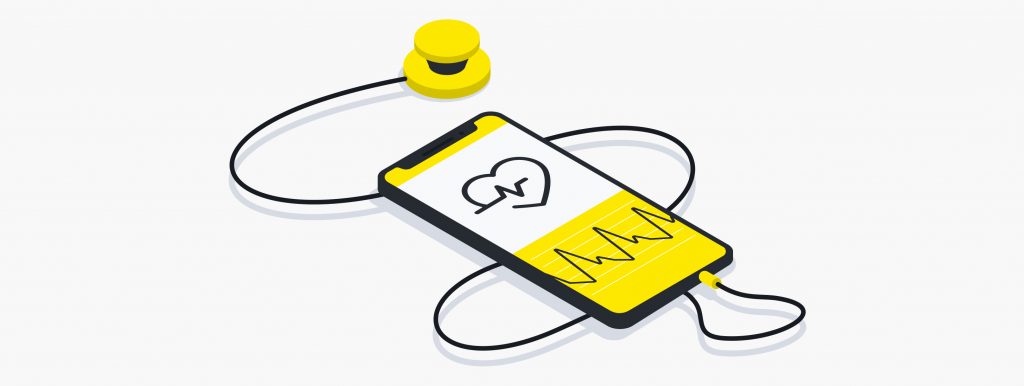Today a wide range of medical competitors, mounting operational costs, the coronavirus pandemic, and changing patient needs are directly impacting the medical field.

Modern challenges force healthcare organizations to improve their decision-making processes, placing additional emphasis on the implementation of analytical strategies: the global market for healthcare analytics is expected to reach $50.5 billion by 2024 from $14.0 billion in 2019.
What insights can healthcare analytics provide?
Healthcare analytics involves statistical and quantitative analysis as well as analytical models to help understand future events and support decision-making.
Healthcare analytics can be divided into 4 main categories of increasing difficulty:

- Descriptive Analytics
It accumulates patient historical data, creating a summary with actionable insights for further analysis. Such kind of analytics helps you to answer questions like “How many patients were hospitalized during a certain period?” or “How many patients dropped home therapy?” - Diagnostic Analytics
It is based on statistical data and analyzes it for clustering, classification, specification, and correlation detection used to identify critical factors influencing healthcare outcomes.This type of analytics processes the collected data using more complex algorithms than descriptive analytics. Thanks to diagnostic analytics, it is possible to study complex problems in detail, identify weaknesses, and describe data patterns. - Predictive Analytics
It predicts future events based on the analysis of accumulated information. These analytics can use a variety of methods: mathematical statistics, modeling, Machine Learning, Computer Vision, Data Science, Data Mining, and more.For example, predictive analytics can help you determine in advance which patients have the highest risk of hospitalization next month based on past experience. - Prescriptive Analytics
It is AI-driven analytics that processes all the accumulated data to find the best solutions for a specific problem. Prescriptive analytics allows physicians to provide effective recommendations for patient care.By identifying which factors can be changed, analytics can provide tips related to operational efficiency and patient care that can help you to achieve better healthcare outcomes.
Thus, healthcare analytics is a tool that can be used to get many important insights about patients, treatment, and hospital management. This information helps in improving people’s health and accelerate the workflows of medical institutions.
What advantages can healthcare analytics solutions bring to hospitals?
- Better diagnosing diseases
Healthcare analytics can become your smart assistant in the diagnosis, prescribing therapy, and interpreting the results of studies, in particular, computed tomography (CT) and magnetic resonance imaging (MRI).An MRI examination may take an hour or even longer, but there are already developments aimed at changing this process. In 2018, Facebook announced a system based on Data Science, which allows you to speed up MRI studies by 10 times due to accelerated scanning. The system, trained on the basis of three million MRI images, analyze scans with the help of artificial neural networks.Analytical solutions based on Machine Learning, Computer Vision, or Data Science can process historical healthcare data and identify what questions and in what order to ask patients for the most accurate diagnosis. - Decreasing operational costs
Healthcare analytics can also provide clinics with financial reports about inventory, vendors, supply expenses, and more. This strategy can help medical providers reduce the cost of delivering services, optimize their budget, and gain competitive advantages.Regular reports can also help you to improve billing efficiency. Analyzing your financial operations can help you to get insights on your budget spent and minimize losses by detecting redundant billings, duplicated orders, and so on. - Improving treatment quality
Sometimes physicians can make errors in data entry, prescriptions, and more. According to the Business 2020 Data Breach Investigations report, basic human error accounted for around 31% of healthcare breaches. This not only increases the risk for patients but also increases the insurance costs of medical institutions.Analytical platforms can be used to monitor and analyze data about patients and their prescribed medications. It allows doctors to rapidly notice peculiarities of patient health and timely inform users about unusual prescriptions or dosages. This is especially useful in a rapidly changing environment, where doctors work with a big number of patients every day. - Improving patient centricity
Medical analytics provides data that helps healthcare professionals make better decisions, thereby improving the quality of care. Healthcare analytics allows doctors to automate data processing and pay more attention to patients.This approach not only improves the relationship between doctors and their patients but also reduces the rate of hospitalization and reduces the occurrence of serious health problems. - More personalized treatment
Predictive analytics can provide more personalized care and improve the patient experience. It helps hospitals understand what treatments work best for each patient at the lowest cost. It also equips doctors with effective tools to access and analyze medical data to improve their patients’ health.Discovering correlations and hidden patterns in patients’ data can provide you with complex individual predictions that help to create specific treatment plans accelerating the recovery.
Analytics solutions bring all the important data together into complete reports helping you improve the quality of diagnostics, reduce costs, and enhance the knowledge of your medical staff.
Exposit Team creates quality HealthTech solutions ensuring effective working processes in hospitals and improving decision-making. Contact us to implement a smart Healthcare analytics platform into your hospital workflow using the latest technologies and development approaches.






